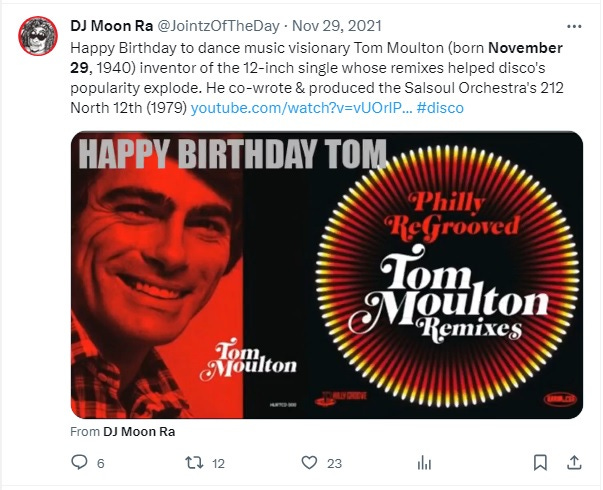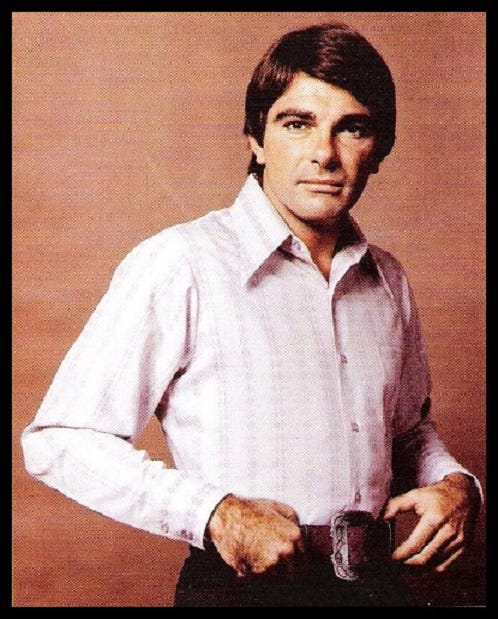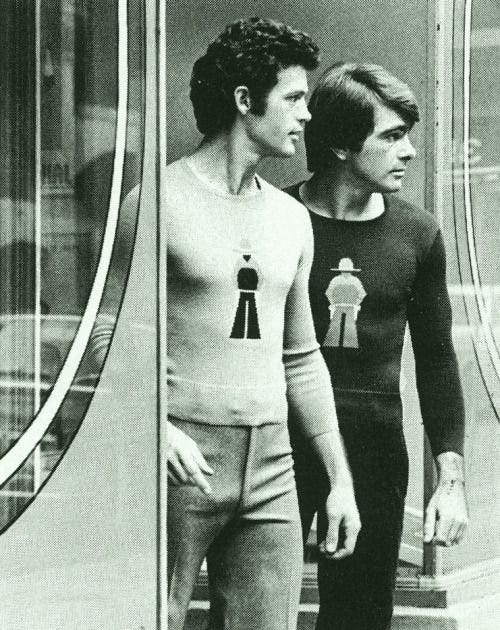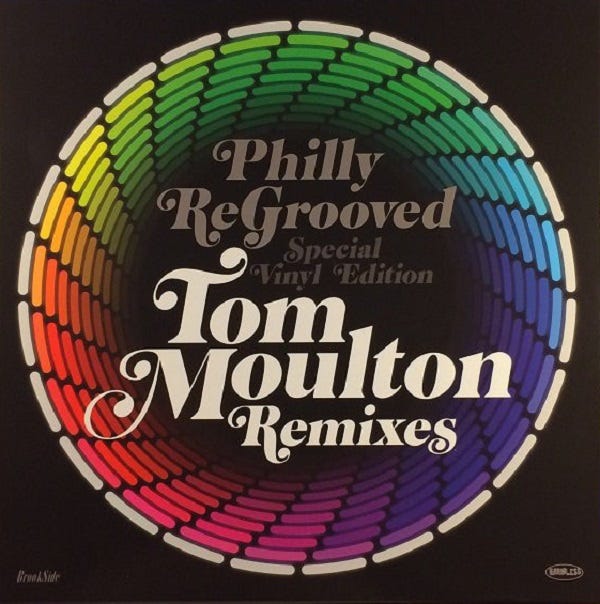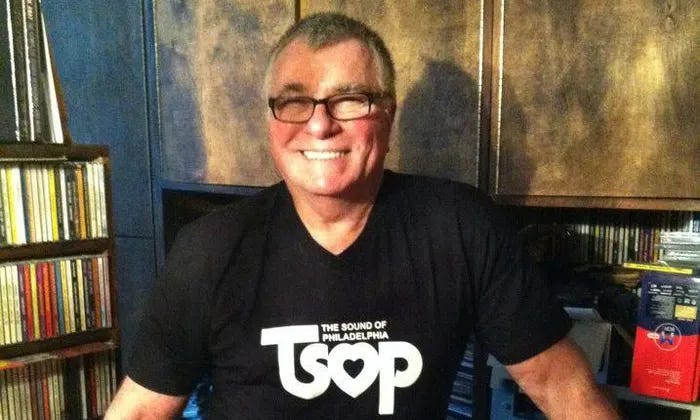Tom Moulton (born November 29, 1940) – 212 North 12th (1979)
The famed DJ and producer who invented the 12" single and disco remixes co-wrote and produced this epic disco jam for the Salsoul Orchestra's Street Sense LP.
Watch full video on Twitter.
View most updated version of this post on Substack.
Tom Moulton is a DJ, remixer, songwriter and producer who invented the 12” vinyl single and whose prolific remixes helped turbocharge disco’s dancefloor excitement as it became an international phenomenon in the 1970s.
Born in Schenectady, New York, both his parents were jazz musicians. Moulton developed a love for R&B growing up in the fifties, and wanted to be a DJ from a young age. At age six, he begged his mother to buy him his first record, “One O’Clock Jump” by Count Basie. As he recalled in a 2011 interview, “When I was a little kid, I always thought I’d grow up and play records on the radio and turn people on to music and have it all beautiful and nice. That’s what I really thought it was like.”
He moved to Los Angeles after high school and got a job working for jukebox manufacturer Seeburg as a 45s buyer, one of the team responsible for choosing which records would be available at the company’s “one-stop” outlet where jukebox owners would buy records to fill the machines. From 1959-61 he worked for Syd Nathan’s King Records label doing sales and promotion in San Francisco. In the early sixties, he returned to the East Coast and subsequently worked in record promotions for RCA and United Artists. But he quit in 1970, and years later explained why:
“I got fed up with the music business. I like to be honest about a record. But they didn’t want you to do that. It might be the owner’s girlfriend who’s singing on the record, and you have to constantly plug it. That’s not my style. There was so much phoniness. You couldn’t be honest; no one wanted to hear that. They wanted to hear the hype. It was all about hype, not about what’s real. You had to exaggerate everything. And I kind of got fed up with that.”
His rugged good looks soon got him noticed by a modeling scout on the streets of New York City, and he began a modeling career in the early seventies. While working at the Bookings and Ford agencies, he met another model named John B. Whyte who owned the Botel, the only guesthouse in the Pines, a section of Fire Island off the coast of Long Island that was the summer resort of choice for the city’s upper middle class gay men.
At Whyte’s invitation, he went to check out the dances being held at the Botel, and was blown away by the enthusiasm of the dancers for upbeat soul and R&B records. But the existing DJ was unable to smoothly transition from one song to the next, so in the summer of 1972, Moulton decided to make a reel-to-reel mix tape for Whyte to play there. It took him 80 hours to put together a seamless 45-minute mix, but Whyte was not impressed.
When Moulton went to pick up his tape, he luckily ran into the owner of the nearby club The Sandpiper while waiting for his boat, who asked Tom if he could try it out there. It bombed the first night they played it, on a Friday, but was an immediate hit with Saturday’s crowd. The Sandpiper contracted with Moulton to produce new tapes for big holiday weekends, which he did, nine in total over the next two summers.
Working on the tapes led Moulton back into the music industry in his quest to perfect the dancefloor experience:
“I was trying to get instrumental versions of things so I could make records longer. How excited could you get in three minutes? Not very. Sometimes you got lucky, the songs connected and took it to a whole other level. It made me wonder, what if you could take a song and really extend it so you’d have this mood going up and up and up? So I had this crazy idea to try that. That was my concept. I didn’t believe that you could get too much of a good thing.”
Moulton’s very first remix was produced in Philadelphia during 1973, for “It Really Hurts Me Girl” by the Detroit vocal group the Carstairs. The single was set to be released that year on independent label Red Coach Records, but only promo copies were issued before Red Coach lost its Chess/GRT distribution. The single did not come out, and Moulton’s remix remained unreleased.
Influential UK Northern Soul DJ Ian Levine discovered a promo copy with the original mix on a trip to Miami. When he played it back home, as he described it, it became “the biggest record EVER at Blackpool Mecca.” It was the record that kicked off the entire modern soul movement which led many Northern Soul fans to embrace a new crop of overlooked seventies soul artists.
In early 1974, Moulton visited Scepter Records’ offices at 254 West 54th Street in Manhattan, located above the future location of iconic nightclub Studio 54. Scepter executive Mel Cheren (the future Paradise Garage and West End Records owner) was a regular at the city’s underground discos and on Fire Island, and gave Moulton an extra copy of the master tapes of a recent Scepter single, “Dream World” by Don Downing. Moulton returned a few days later with a remix that blew Cheren away. “We were amazed,” Cheren wrote in his autobiography. “A so-so record was suddenly snappy, upbeat, and ten times better.”
Moulton had extended the track to five and a half minutes long, twice its original length, and in the process invented the extended disco breakdown. He created an extended instrumental section before reprising the song’s intro by stripping the track down to its drums and percussion before bringing the bass and piano back in, creating “tribal pounding that went on and on,” in Cheren’s words, “perfect for dancing yourself into a trance.” Instrumental breaks had existed in plenty of other records, but had never been as long.
Mel Cheren and Tom Moulton with unknown friends
A shorter, 4:13 version of Moulton’s “Dream World” remix was issued by Scepter on a 7” single in July, 1974. That fall, Billboard ran an article dated November 2, 1974 which documented its release and how it fueled the rise of the remix:
“Special mixed versions of commercial singles are being offered to discotheques here by a number of labels looking to capitalize on the clubs' growing reputation as record "breakage' points. At such labels as Scepter, Chess/Janus and Roulette, executives say that the clubs are a definite influence in breaking records and that they consider it well worth the time and effort to reach the disco audience. Notably, several of these special mixes have generated local market reaction which, they say, has eclipsed that of the original commercial copy. Also, when local airplay on radio stations is missing, the clubs themselves have the power to move sales.
According to Mel Cheren, Scepter executive, a re- released version of Don Downing's "Dream World" sold some 10,000 units without airplay. The single was released this past July. Scepter has been involved with discos for some time now, says Cheren. Just recently, though, the label began releasing singles with a commercial, radio-oriented song on one side and a disco version on the flip. The Downing single features a disco version running 4:13 in time, while the "commercial" side is 2:36 in length. Cheren states that although a number of radio stations have time limitations on songs played, certain FM stations will go on the more lengthier disco version. Having two versions of the same song on one disk doesn't hurt sales either, he adds.” (Billboard, 11/2/1974, p. 10)
Moulton’s next remix at Scepter was for a group from Brooklyn called Brothers Truckin’, which he thought was a terrible name, and suggested to Cheren they change it to something that sounded more New York, like a subway. Cheren took his suggestion, and the group was re-named Brooklyn Transit Express, aka B.T. Express. Their debut single for Scepter was “Do It ('Til You're Satisfied),” written by Billy Nichols and produced by Jeff Lane. Moulton extended the three and a half minute original to nearly six minutes long, which initially the group hated. But after the song went to #1 R&B and #2 on the Billboard Hot 100, they told Don Cornelius on Soul Train they had recorded it that way.
In 1975, Moulton put together the superb disco compilation Disco Gold for Scepter Records, featuring many of his early mixes for the label. The album included his phenomenal extended remixes of Patti Jo’s “Ain’t No Love Lost” and “Make Me Believe In You,” which were written and originally produced by Curtis Mayfield in 1973. See our earlier post on Mayfield for more background on the latter track.
Moulton’s “Disco Mix” of “I’ll Be Holding On” by Don Downing’s brother Al Downing went to #1 for three weeks (December 28, 1974 - January 11, 1975) on Billboard's brand new Disco Action charts.
Its success prompted Moulton to return to the studio for another remix, 4:12 in length, which he took to New York's Media Sound to have a test copy pressed on a Friday night in early 1975. In a fortunate twist of fate, no 7” acetates could be found, so mix engineer José Rodríguez pressed the remix onto a 10” acetate. Moulton felt silly when he saw all the wasted space on the disc, so he asked Rodríguez to re-cut it using the full width of the acetate, which as it turned out could only be done by greatly increasing the track’s levels.
The end result was a much louder sound and a wider dynamic range (the difference between the loudest and softest sounds that could be heard). Moulton immediately realized a larger format “just made the regular forty-fives sound like such sh*t.”
His remix of “I’ll Be Holding On” from that night, although a part of music history as the very first large format single ever made specifically for DJ’s, was not released until decades later on a compilation of Moulton’s most celebrated mixes. But before long, promo-only 12” singles were being produced by Scepter and other labels for DJ’s in the growing disco scene in New York City and beyond.
Moulton pulled another innovation out of his hat when he was called in to mix Gloria Gaynor’s 1975 debut album Never Can Say Goodbye, released on MGM Records that January. He mixed the album’s three cuts on its first side together into one continuous disco mix, the first ever released on an album.
Tom Moulton with Harry Chipetz and Leon Huff
Moulton was producing his own records by the late seventies, including First Choice’s classic 1979 LP Hold Your Horses, which he co-produced with Þórir (aka Thor) Baldursson. It featured his stellar mix of the title track, which reached #73 R&B. An extremely rare acetate produced almost exactly forty-five years ago on November 27, 1978 while the album was being recorded contained three tracks that were never released.
Tom Moulton with First Choice
For the Salsoul Orchestra’s 1979 LP Street Sense, he co-wrote and produced the epic disco jam “212 North 12th,” which was the address of Sigma Sound Studios in Philadelphia. It was co-written by Thor Baldursson, who also arranged, conducted and played keyboards on the track. Other members of the orchestra featured on the album included Earl Young on drums, Larry Washington on congas, Craig Snyder on guitar, James Williams on bass, and Don Renaldo handling strings and horns.
He also produced special acetate-only remixes for his DJ friends like Larry Levan, such as his extended mix of Little Sister’s “You’re The One” (1970) which was written and originally produced by Sly Stone.
Happy Birthday to the dance music visionary Tom Moulton.
Further info:
“Music history - Tom Moulton,” Fire Island Pines Historical Society.
“Rock and Roll: Make it Funky / Interview with Tom Moulton Parts One and Two,” interview, WGBH.org, 1995.
“Interview: Tom Moulton,” by Bill Brewster, DJHistory.com, September, 1998.
“Beat Doctor: Tom Moulton’s extended disco remix forever changed recorded music,” by Andrew Mason, Wax Poetics, Issue 45, January/February 2011.
“A Beginner’s Guide to Tom Moulton, inventor of the remix and the 12″ single,” Fact Magazine, May 10, 2013.
#soul #funk #disco #remixers #TomMoulton




